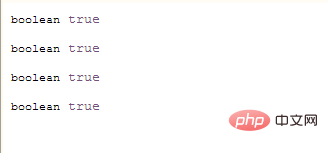
In PHP, a comparison operator is a symbol that allows two values to be compared; when an operator is used to compare two values, the result is a logical value: TRUE (true) or FALSE (not true) ). Among the PHP comparison operators, "==" and "===" can be compared for equality, "!=", "" and "!==" can be compared for inequality, "", "=" can be used for size comparison.

The operating environment of this tutorial: windows7 system, PHP version 8.1, DELL G3 computer
Comparison operators in php
Comparison operators, as their name implies, allow two values to be compared.
When an operator is used to compare two values, the result is a logical value, either TRUE (true) or FALSE (not true).
The comparison operators in PHP are shown in the following table:
| Example | Name | Result |
|---|---|---|
| $a == $b | is equal to |
true, if $a is equal to $b after type conversion. |
| $a === $b | Congruent |
true, if $a is equal to $b, and they are also of the same type. |
| $a != $b | Not equal |
true, if after type conversion$a is not equal to $b. |
| $a $b | Not equal |
true, if type conversion After $a is not equal to $b. |
| $a !== $b | not congruent |
true, if $a is not equal to $b, or they are of different types. |
| $a | is less than |
true, if $a is strictly less than $b. |
| $a > $b | is greater than |
true, if $a is strictly greater than $b. |
| $a | is less than or equal to |
true, if $a is less than or equal to $b. |
| $a >= $b | is greater than or equal to |
true, if $a is greater than or equal to $b. |
| $a $b | Spaceship operator (combination comparison operator) | When$a is less than , equal to or greater than $b Returns a int value that is less than, equal to, or greater than 0 respectively. |
| $a ?? $b ?? $c | NULL merge operator | The first one from left to right that exists and is not NULL Operands. If neither is defined and is not NULL, NULL is returned. Available starting with PHP7. |
Comparison of numbers and strings
If you compare a number and a string or compare strings involving numeric content, the string will be converted to a numeric value and the comparison will be based on the numeric value. conduct. But when comparing with === or !==, no type conversion is performed, because both types and values are compared at this time.
For example:
<?php
var_dump(0 == "a"); // 0 == 0 -> true
var_dump("1" == "01"); // 1 == 1 -> true
var_dump("10" == "1e1"); // 10 == 10 -> true
var_dump(100 == "1e2"); // 100 == 100 -> true
?>
Type conversion
About type conversion in different type comparisons

Usage of comparison operators
Comparison operators are commonly used in if conditional statements to determine whether the program should Which branch to jump to;
if statement is equivalent to reaching multiple end points from one starting point in life. There are many forked roads. Which one to take requires our choice and judgment;
comparison operations are commonly used In the conditional judgment statement, for "==", when the left and right ends are equal, TRUE is returned, otherwise FALSE is returned;
For "==", the operands on both ends are equal, and the values must be equal. The types must be the same before TRUE will be returned, otherwise FALSE will be returned;
The operation process of the comparison operator, example:
<?php $a=36; $b=30; echo "判断a是否等于b:"; echo $a == $b; echo "\r\n"; echo "判断a是否大于b:"; echo $a>$b; echo "\r\n"; echo "判断a是否小于b:"; echo $a<$b; echo "\r\n"; ?>
The execution result is as follows:
if judgment statement
a. Single branch syntax:
if(条件){
//代码
}If there is only one code in the if block, the braces can be omitted of.
if(20>10)echo 'true';
Alternative syntax { = : } = endif
if(20>10):
echo 'true';
endif;
for():
endfor;b. Double-branch syntax:
if(条件){
//代码
}else{
//代码
}c. Multi-branch syntax:
if(条件){
//代码
}elseif(条件){
//代码
}else{
//代码
}Supplement: Multiple selection syntax:
switch(表达式){
case 常量:
代码;
break;
case 常量:
代码;
break;
default:
匹配失败
}Recommended learning: "PHP Video Tutorial"
The above is the detailed content of What does comparison operator mean in php. For more information, please follow other related articles on the PHP Chinese website!